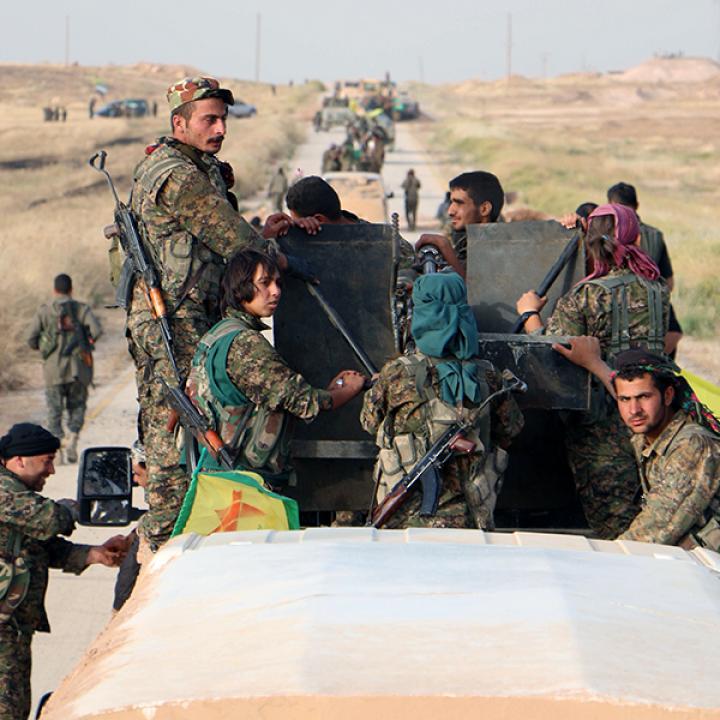
- Policy Analysis
- Fikra Forum
The American-Turkish Relationship in Syria

The Kurdish question in Syria has long been a point of contention between the United States and Turkey. Throughout former president Barack Obama’s time in office, the primary determinant shaping U.S. strategy against ISIS was a reliance on Kurdish forces. This furtive reliance existed despite Turkish refusal to allow the Kurdish-dominated Syrian Democratic Forces (SDF) to spearhead the battle to liberate Raqqa. It would appear that Turkey has now lost all confidence in U.S. policy, particularly since the SDF refused to withdraw from Manbij, as President Obama had promised Turkish President Recep Tayyip Erdogan they would.
U.S. policy towards the Kurds in Syria has not changed much since the Trump administration took office earlier this year. The president was clear throughout his election campaign that the Kurds and U.S.-backed Kurdish forces would be a mainstay of his policy in the War on Terror and the war against ISIS.
At the same time, it is clear that Turkey has the ability to undermine any solution in the Syrian Jazira province that it perceives as a threat to its national security. Turkey has powerful allies within the cities that make up the Syrian Jazira; allies whose ideological backgrounds and visions for the future do not intersect with Democratic Union Party (PYD) ambitions of establishing a “Syrian Kurdistan.” This dispute could, at any stage, develop into a conflict resulting in intra-Kurd clashes that could rip apart the Kurdish fabric in Syria.
It is also apparent from Turkish reactions to U.S. support for Kurdish forces in Syria that Turkey is prepared to go to the limits to defend itself from the prospect of a self-governing Kurdish region along the Syrian-Turkish border—something it considers a grave national security threat. This fear is largely due to Turkey’s past experience fighting the PKK, which as a Kurdish Marxist party garnered support and funds from Hafez al-Assad. Assad hosted the PKK leadership in Syria and Lebanon and opened military training centers for them, and they went on to launch attacks against Turkey over a period of thirty years. The PKK is now designated as a terrorist organization by Turkey, the United States, and the European Union.
The United States has repeatedly tried to solve the crisis of Kurdish involvement by finding Sunni Arab allies that can be included in their fight against ISIS, but the tools and means of selection used by the U.S. administration have not suited Turkish aspirations; Ankara has reserved strong alliances with Arab forces in the Syrian Jazira for itself. Instead, the Turkish government has tried to establish a template for what it expects from the United States based on its previous approach to and experience in Jarabulus.
It is impossible to ignore Turkish interests in Syria if one is to acknowledge its criteria for national security. Likewise, Turkey cannot ignore the United States’ role in the region or the United States’ propensity for defining its own interests and threats overseas. Ignoring either of these due to a lack of US-Turkish coordination is detrimental to the interests of both nations. As a result, it seems that the only solution is for the United States to apply pressure on Syrian Kurdish parties to break their ties with the PKK. The United States has already proven its ability to pressure Kurdish forces, as demonstrated by the withdrawal of the SDF from twelve villages east of the Euphrates. At the same time, the PYD must take steps to build trust with Kurdish and Arab communities as well as the Turkish government. This can be done by releasing the Kurdish leaders it has detained, allowing Peshmerga forces to return to the Jazira, establishing closer ties with the Free Syrian Army in the areas around Afrin and Raqqa to fight ISIS and Jabhat al Nusra, and expelling all foreign elements from its military apparatus.
From its latest visit to Washington, it seems that the Kurdish National Council realizes Turkey’s role and the difficulty it will have avoiding increased tensions in the event that Kurdish plans conflict with Turkish interests. Likewise, it would seem that the Turkish government is not opposed to the establishment of a Kurdish region in Syria so long as this region is not hostile towards the Turkish state. This means that a Syrian Kurdistan should be prepared to establish relations with Turkey along the same lines as Turkish relations with Iraqi Kurdistan.
The rationalization of U.S. military support for Kurdish forces in Syria would open the door for democratic change in Syria-- to the satisfaction of most international parties--and would make the Kurdish model, in cooperation with other groups of the Syrian population, the key to a long-term solution instead of leading to new long-term internal hostilities.


